- Home
- Persia Woolley
Queen of the Summer Stars Page 2
Queen of the Summer Stars Read online
Page 2
“Of course you can.” Ulfin’s voice was stern and confident, “The Queen Mother’s as fond of you as though you were her own daughter, and the chances are she doesn’t want to be healed, but eased into death with a loved one near. The sooner we get started, the sooner she’ll be comforted.”
I nodded mutely, hoping he was right. Birth and death are as much a part of life’s tapestry as singing and dancing and gathering up after war, and to avoid them is to avoid being human. But the idea of losing Igraine opened a terrible, sad ache inside me.
***
We rode silently through the town, past half-ruined houses and empty shops. Like most Roman things, they were only partially used, for the years of decay since the Time of Troubles had taken their toll. I’d never been as comfortable in the stiff, square buildings of the Empire as I was in the thatched roundhouses and wooden halls of my youth, and now the half-deserted town added to the bleakness of my mood. When we passed the outer earthworks and headed down the Road to Bath, I pulled my cape tighter around my shoulders and concentrated on the dearest memories of my mother-in-law.
When we’d first met, she was beautiful and serene—the very embodiment of queenly dignity. I’d stood awestruck before her, a rough northern girl, plain of face and awkward in manner, with no idea what was expected of me.
Used as I was to the freedom of Rheged’s mountains and valleys, this marriage was none of my doing. I’d had no desire to learn Latin, or wear dresses, or go south to marry that new High King. Angry, rebellious, foiled in an attempt to run away, I had not gone willingly to my fate. But personal desires are rarely considered in political marriages, and no one seemed to care how I felt about the matter. No one, except Igraine.
She’d come out of retirement to greet her son’s bride and shape my future as surely as Merlin shaped Arthur’s. I was—and sometimes still am—too outspoken to please most nobles, and my life at the High Court could have been a misery if the Queen Mother hadn’t taken me under her wing. During the months after the wedding, when Arthur was off at war, she smoothed my tomboy ways into some semblance of grace, and taught me to look beneath the surface of the people around me. It was then we had become close, and she’d told me any number of stories of her early life. She did not, however, talk about Arthur’s origins, or how she herself came to be High Queen, and I lacked the courage—or rudeness—to ask about it.
The common folk claimed Arthur’s birth was the result of magic—that Merlin created him to fulfill the prophesy that a great king would rise out of Cornwall and lead the Britons to victory against the Saxon invaders. There were stories of dragons and comets, and mighty spells cast over the fortress at Tintagel. I was sure there was more to the story than legend allowed, and hoped I might understand Arthur better if I could figure out the riddle of his parents.
Igraine was regal and dignified, and always thought of the needs of others, while Uther—by all accounts—had been harsh and abrasive, and was as much feared as Igraine was loved. Indeed, the very fact that they’d become a couple at all seemed a puzzle to many, including me.
Born of the royal line of Cunedda in southern Wales, Igraine would have known a life of ease and luxury but for the shadow of Vortigern, the Wolf; even the established families of the Empire walked cautiously in the days of the tyrant.
Like most British children, I’d listened to the elders tell the stories of Vortigern, who rose to power following the Time of Troubles, after the Legions were taken back to the Continent to support Constantine’s bid to become emperor. Seeing Britain left defenseless, our barbaric neighbors—Pict and Irish, Angles and Saxons—rushed to plunder the rich Roman province. But though we begged Rome for help, the reply was an admonition to look to our own defenses because the whole of the Empire was crumbling and there were no legions to spare.
In the chaos that followed, Vortigern had clawed and schemed and murdered his way to supremacy over the other warlords who were carving out kingdoms for themselves. Once in power, he offered to make the Saxons Federates, giving them both land and money if they’d help us fight off the rest of our enemies.
“Invited the sea wolves right into the sheep-fold, he did,” my childhood nurse used to say. “Anyone could see they’d revolt against him sooner or later. By then he’d fallen in love with the Saxon chief’s daughter, Rowena…stupid old man put aside his British wife to marry the pretty lass with the flaxen hair, and gave her father the kingdom of Kent to seal the bargain! One wonders how he slept at night, knowing the people cursed him for the turncoat lie was!”
Indeed, both Vortigern’s waking and sleeping were troubled, for there were rumors that Ambrosius Aurelius and Uther Pendragon, the sons of the rightful ruler, were building an army in Brittany, and would one day return to claim their throne. So Vortigern sent his spies everywhere, until fear begot constant suspicion, and tyranny replaced leadership.
“I was eleven when the tyrant’s men swept through my father’s villa, murdering them all,” Igraine had once told me. “If my parents hadn’t sent me away with their old friend the Duke of Cornwall the night before, I would have been killed as well, for the tyrant’s men spared no one. But instead I grew up in Gorlois’s stronghold at Tintagel, as the Duke’s ward.”
Igraine was very happy there, playing in the meadows at the top of the cliffs while the surf crashed and pounded on all three sides of the headland, and rainbows hung in splendor over the ocean.
I could easily imagine her—a shy, quiet girl, quite unaware of her own startling beauty, who preferred to spend her time with the wild creatures of field and air rather than in the Hall. She soon developed great skill with wild things—rescuing fledglings that fell from nests, and once even healing a fox kit with a badly gashed paw.
“But best of all,” she’d confided, “I liked standing beneath the Sacred Oak, safe and secure while the wild wind whipped around me. There was an excitement in it that made my blood sing…”
Gorlois was as magnificently rough-hewn as his fortress, and when she was fifteen, his beautiful young charge agreed to marry the widowed Duke. So they made their vows under the branches of the Sacred Oak, and when their daughters Morgause and Morgan were born, they too were brought there, barely dry from birthing, to be offered to the Old Gods.
And it was at the Oak that Igraine left votive gifts of flowers and bright ribbon when Gorlois went off to join Uther and Ambrosius in their battle to depose Vortigern. By then Igraine had become a young matron, bringing the same care and devotion to the raising of her lively children that she used to lavish on the small wild animals she’d nurtured as a girl.
“I had no interest in going beyond the narrow path that connected Tintagel with the rest of the world,” she’d said with a twinkle of wry amusement. “I clung to the safety Gorlois provided, content with the moira the fates had given me—and would have run in terror if anyone had told me someday I would become a queen.”
Even after Ambrosius overcame Vortigern and Gorlois returned to Tintagel with wonderful tales of the new High King, Igraine listened with little curiosity. And when her husband tried to get her to go to the High Court with him, she begged to stay in Cornwall, for the idea of leaving Tintagel filled her with dread.
But what was put off that summer became a necessity several winters later when Ambrosius died and his brother Uther Pendragon became High King. There was no escaping the summons to Winchester to swear fealty to the new overlord, and though Igraine tried to persuade her husband to go without her, it was to no avail.
“I served under Uther in battle,” Gorlois announced, “and know how volatile his moods can be. I’ll not risk calling down the Pendragon’s wrath on this house, so we’ll go to the King Making despite weather and calendar and the fact that you’ve no desire to travel.”
And that was that. When they departed for the High Court Igraine rode beside her husband, as calm and valiant a partner as anyone could wish, with no outwar
d sign of her inner turmoil.
“It comes,” she’d noted, “of being born to a long line of Celtic queens.”
***
I smiled at the memory of her words, for I too had been raised in the tradition of brave and competent women, and knew the litany by heart; it was one of the things that the Queen Mother and I used to joke about.
But I was not sure I could have coped with a man like Uther, and sometimes wondered how much like his father Arthur might turn out to be.
Ulfin was leading us across the broad sweep of the Berkshire downs by now, and the morning showers had turned into real rain as Uther’s Chamberlain dropped back to ride next to me.
“There’s an inn by the ford, not far ahead. I know the man who runs it, and it’s a good place to spend the night,” he announced, and I nodded my agreement.
“Tell me, Sir Ulfin—were you with Uther in Brittany, before the invasion?”
“Aye, M’lady. I was raised in their military camp on the Breton shore. My father was a Master Armorer, helping to outfit both warriors and nobles for the invasion to come…it took years to ready the army, and by that time I was grown myself. As was Merlin, the young druid who came to join our cause. So I guess you could say I’ve known them all, from early days on.”
“What were they like?” I asked.
Ulfin considered the matter. “Well, it was clear from the beginning that Ambrosius was the one cut out to be king. Thoughtful, almost philosophical, he weighed all aspects of a thing before making a decision. He kept the druid by his side, and after the invasion recognized Merlin as his own son, though born out of wedlock. Between the two of them, they had great plans for Albion.” The old warrior paused, letting the ancient name of Britain hang on the air. “Great plans. And perhaps if Ambrosius had lived longer…or if Uther had kept Merlin for his own counselor, once he became King…but they had a falling out, those two, and Merlin went back to his cave behind Carmarthen.”
“Even before the events at Tintagel?” I prompted, hoping I wasn’t asking him to betray any secrets.
“Oh yes. You must remember that Uther was a different stripe of cat from Ambrosius—taut as a bowstring, with action always at his heel, as though he were goaded by a renegade God. It made him a fine leader in battle, but not a favorite among the courtiers—why, the soldiers voted him into the Kingship before the nobles even knew Ambrosius was dead, and many of Ambrosius’s followers weren’t too happy about it Some thought Merlin should have been made High King, but the Enchanter was more interested in cosmic things. Uther was relieved to get rid of him, and I wasn’t surprised when Merlin left; they were too much like oil and water to work together well.”
The Chamberlain chewed on his bottom lip and shook his head in bemusement.
“After Merlin’s departure I tried to take up some of the slack, for no one else had the courage—or effrontery—to advise the Pendragon. I urged him to use the occasion of the King Making to allay the fears of his courtiers. I particularly reminded him that while he was in the field, leading the men to victory, no one cared where he spread his seed, but now that he was High King and must live with the memories and grudges of his nobles, he should be looking for a wife of his own, not raiding the beds of others.
“Lot of good that bit of advice did, after he saw Igraine,” Ulfin commented ruefully.
“We’d all heard of her before she came to Court, of course, for rumor said she was fair enough to tempt the Gods, and faithful to the Duke as well. Uther joked about the old man who claimed her for his wife. Not meaning any disrespect,” the Chamberlain added, making the sign to appease the dead, “but the Pendragon was a randy sort, and likely to say right out what others were thinking quiet to themselves. He hadn’t reckoned on Igraine’s having a mind of her own, however—or that she might not want him.”
We were coming down the long, sloping side of a down, and the checkered sign of the inn ahead gave promise of a warm welcome.
“It was a chancy time for a while, I can tell you,” Ulfin concluded. “And I’m glad to say I was the one who convinced Uther to call on Merlin for help. So it all came well in the end, if not exactly the way anyone expected. But then, you never know how things will go with sorcerers, eh, M’lady?”
By now we’d turned in at the tavern courtyard, and Ulfin had many other things on his mind, so I put aside my curiosity about Arthur’s father and went up to the room the innkeeper gave me, away from the noise and smokiness of the pub.
The innkeeper sent up a tray of food, and I ate the savory stew slowly, trying not to think about Igraine lying ill, with nothing ahead but a cold grave. Afterward I got into my sleeping robe and sat by the brazier for a while, staring into the embers and wondering what had really happened at Tintagel. Arthur didn’t know, Merlin wouldn’t tell, and with Igraine so close to death, it seemed likely the truth would go to the grave with her.
It was late when Ulfin knocked on the door, come to see if I needed anything before we all went to sleep. He took one look at my face and, closing the door behind him, brought me back to the chairs by the fire.
“It will do no good to brood, M’lady—just give you bad dreams and drain you of strength you could give the Queen Mother. Besides,” he added, seating himself across from me, “you mustn’t think that Her Highness’s life was all duty and responsibility. She was full of laughing, lilting ways when she and Uther first ruled the realm. Not, of course, out in public; she was always quiet and regal before her subjects—but when they were in the arms of the family, you might say, she wasn’t reserved at all.”
A fond smile played over Ulfin’s features and he reached up to take a small leather pouch from around his neck.
“Uther’d never met a woman he couldn’t bend to his will, but Igraine was different—she wasn’t the sort to be intimidated. I’ve seen her call his bluff and have him end up laughing about it more than once. And for all that they were an unlikely pair, it was well for both Britain and its leader when she became High Queen. That’s something I’ll always be proud I had a hand in. It was after their wedding that he gave me this…”
The Chamberlain carefully took a golden ring from the little pouch and put it into my hand. “I was thinking that, seeing as how she’ll be buried on Christian ground, not next to her husband, Her Highness might want to have something of his to take to the grave.”
I looked down at a gold band with a bright design of color around its rim. It was much heavier than the little enamel ring of Mama’s that I wore, but the workmanship was very similar.
“Now you just get yourself into bed, M’lady,” Ulfin admonished. “I’ll call for you in the morning…and I don’t want to see your eyes all red from crying, either.”
I thanked the Chamberlain for his concern, and, after he left, sat staring at the ring and thinking of Ulfin’s words. Finally, with a sigh, I blew out the oil lamp and crawled under the fur blankets.
***
I might not have any better understanding of how Uther and Igraine had come together, but I went to sleep that night imagining her as the bright young Duchess whose beauty and spirit had changed the whole of British history.
Chapter II
Igraine’s Tale
She wanted so much to see you—God willing, she’ll waken long enough to know you’re here,” the Abbess whispered, hurrying me along a cloistered walk toward Igraine’s cell.
A handful of nuns knelt in silent prayer outside the door. The Queen Mother’s young companion, Ettard, was with them, and she looked up at me imploringly, as though I had the power to bargain with fate.
The little room smelled of candle wax and sanctity. An older sister, no doubt versed in healing, rose from the stool beside Igraine’s cot. Giving me a respectful nod, she came to my side and indicated that the end was expected any time.
I thanked her and moved slowly to the foot of the bed as the nurse tiptoed out.
<
br /> Arthur’s mother lay in a deep sleep, her eyes closed, her breathing shallow. Linen sheets covered the narrow pallet, and her hair, once fabled for its gold, now spread over the pillows in a silver cloud. The wasted body barely showed beneath the rough blanket, and she looked more like a child than a powerful monarch. Yet even drawn and pale, Igraine’s features bore the mark of great beauty, and in spite of the dark circles under her eyes, she had a calm and peaceful air. Considering the tumult that had surrounded her life, this serenity in the face of death was all the more touching.
When Igraine had chosen to come live in the convent, she’d left behind all the trappings of her former glory; the cubicle was empty except for the bed and an unpainted wooden chest. A homespun garment hung from a peg by the door, more fitting for a farmer’s wife than a great queen.
The tree beyond the unglazed window was filled with willow warblers. They were Igraine’s favorite birds and their soft calls and silvery trills filled the air, as though already singing her to the Isle of the Blessed. I looked down at her still form and sobbed aloud.
There was a flicker of movement and the dark eyes opened, assessing my presence at the foot of her bed.
“M’lady…oh, M’lady,” I cried, rushing to kneel at her side and pressing her cold hand to my cheek.
“Now, now, child…there’s no need to weep. It’s enough that you got here in time.” She was smiling at me while her fragile fingers tried to wipe away the tears. “Tsch, tsch…I didn’t send for you to watch you mourn. I’m not afraid of dying, and I’ve made my confession already, but there’s still a matter left undone. Are you listening, child?”
“Of course, M’lady,” I gulped. “What can I do?”
“Prop up my pillows, to begin with. I can’t talk lying down, and I want to tell you about Uther, and Tintagel.”

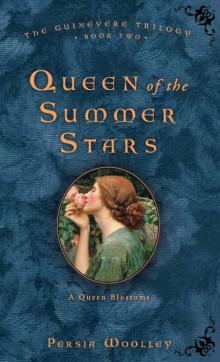 Queen of the Summer Stars: Book Two of the Guinevere Trilogy
Queen of the Summer Stars: Book Two of the Guinevere Trilogy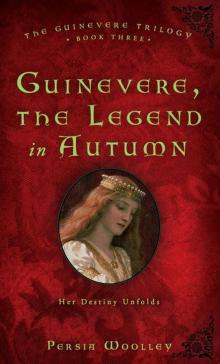 Guinevere, the Legend in Autumn: Book Three of the Guinevere Trilogy
Guinevere, the Legend in Autumn: Book Three of the Guinevere Trilogy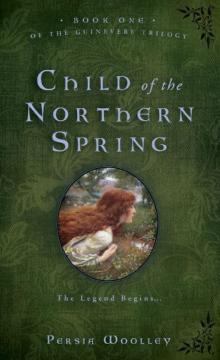 Child of the Northern Spring (Guinevere Trilogy)
Child of the Northern Spring (Guinevere Trilogy)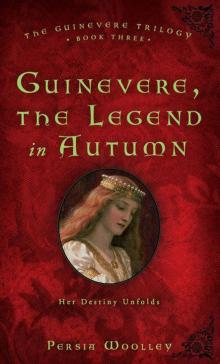 Guinevere: The Legend in Autumn
Guinevere: The Legend in Autumn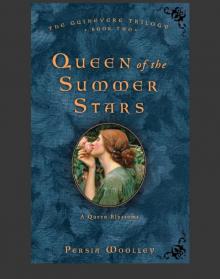 Queen of the Summer Stars
Queen of the Summer Stars